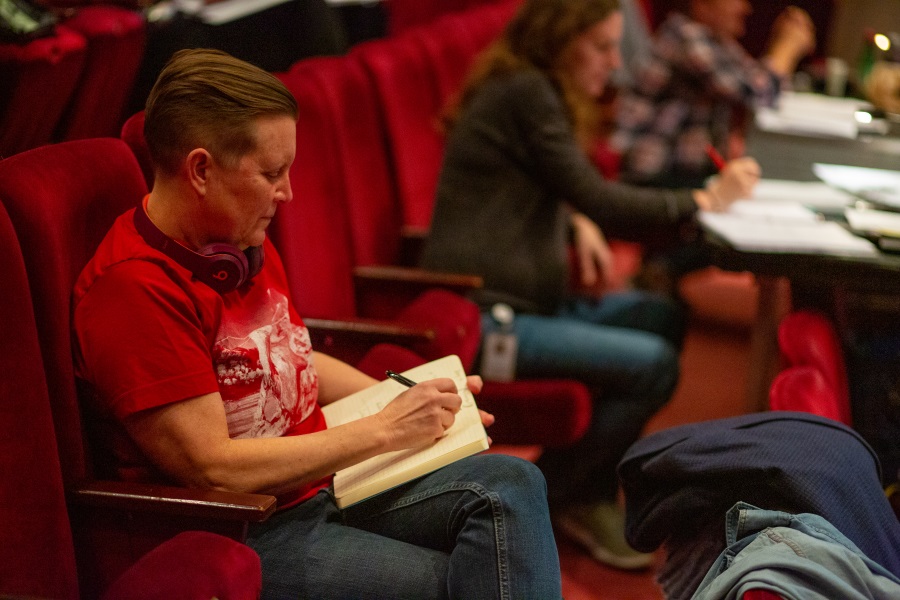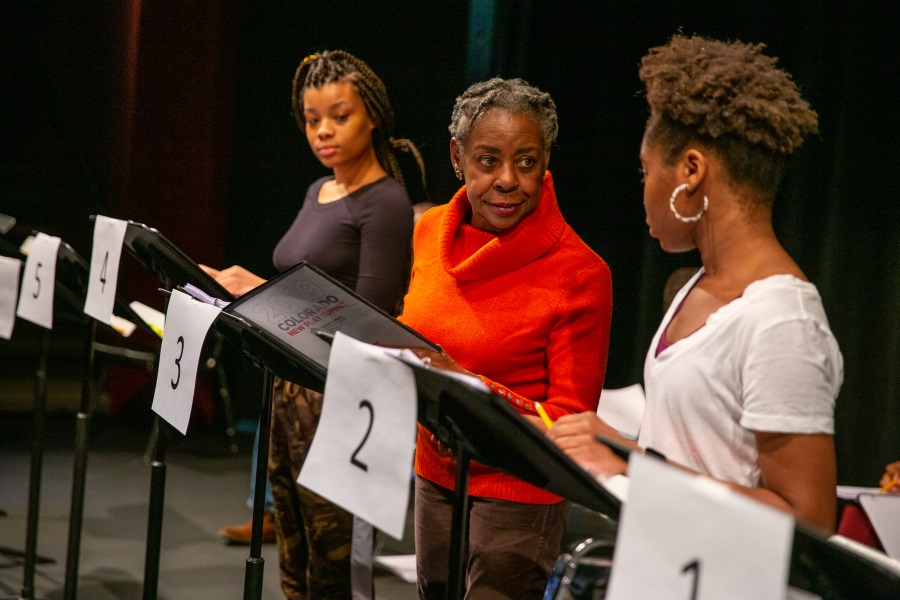Black-and-white photos of Denver’s Tramway building, with its massive trolleys and rows of rails going from street into hulking turnabout, offer an apt metaphor for what took place during the Denver Center’s Colorado New Play Summit (Feb. 16-17 and 22-24). Plays entered the building, got serviced by skilled pros, and were turned around for a journey out into the world.
The theatre company’s studios, offices, classrooms, as well as a 185-seat theatre, are housed in what is now the Robert & Judi Newman Center for Theatre Education, where those framed photos now hang in memory of the building’s former life. The 1911 brick edifice sits across a broad street from the Denver Performing Arts Complex, home to the Denver Center’s six theatres as well as the city’s opera house and symphony hall. Rehearsals for the Summit’s four plays—and a nascent musical—took place in spaces that retain the ridiculously high ceilings of this one-time “streetcar barn.” And if that wasn’t enough activity, the Denver Center included two mainstage world premieres as part of the Summit: Last Night and the Night Before and The Whistleblower.
There’s a healthy spillover of energy in the space. On the second day of rehearsals, strains of music from Rattlesnake Kate, the musical next door, could be heard in the room where Bonnie Metzgar’s play You Lost Me was getting a read-through, then a full parsing. The play tells the story of the wreck of an Irish ship off the coast of Newfoundland in 1824, imagining the repercussions for Ann Harvey—the young woman credited with saving 160 souls—as well as for her modern-day, inn-keeping namesake. The other three plays showcased with readings were Beaufield Berry’s In the Upper Room, about the prickly (full-on understatement) matriarch of three generations of a Black family in Omaha, Neb.; Isaac Gomez’s Wally World, based on his mother’s time as the first person without a college degree to be promoted to manager of a Walmart; and Tony Meneses’s twenty50, which focuses on a political race, and race identity, in the year when folks of color are set to become the nation’s majority.
“It’s so rare to have what Denver Center does,” Metzgar said later, referring in part to the exquisite resource of time but also the creative camaraderie. “You can hear all those other people also doing [the work.] It’s in the walls. They’re alive with all these other plays right next to you. That feeds you—knowing you are part of a process that includes these other shows. Even if you don’t know what psychologically is happening, you can feel it.”
Others could certainly feel—and hear—Rattlesnake Kate, a musical in the early stages of its trek from a concept album by composer-lyricist Neyla Pekarek to a staged collaboration between her and playwright Karen Hartman. Pekarek, formerly of the indie band the Lumineers, found a muse in Kate McHale Slaughterback, a Northern Colorado denizen who earned the colorful moniker in 1925 when she killed 140 rattlers that had the misfortune of crossing her and her young son’s path during a snake migration. Asked after a day into the process about the musical’s own migration, director Chris Coleman—also Denver Center’s new artistic director—replied, “We’re making shit up in the room! They were rewriting lyrics and reassigning lyrics. It is fascinating and it’s messy and crazy.” He paused. “I’ve never been involved where it was finding the form daily.”
The musical is the first commissioned by the company. This was also Coleman’s first Summit as a.d. of the regional heavyweight. The former head of Portland Center Stage was no a stranger to new-play development—PCS has something called JAW to hear and develop fresh work—but Denver’s version is a big, beautiful, commanding beast after 14 years running.
“It’s thrilling that we have three shows up,” Coleman said at the start of the Summit’s first week. In addition to the two world premieres that are part of the Summit, the Coleman-directed Anna Karenina was nearing the end of its run on the Denver Center stage. “I’ve never been in a theatre that could have three shows in three spaces at the same time, and then to have the artists for the Summit arrive,” Coleman marveled. Indeed there were 70 creatives in attendance opening day, not including Denver Center staff. “It’s feeling really exciting—and a lot,” Coleman admitted.

Among new-play gatherings the Summit is unusual for the amount of time it affords playwrights, directors, and casts. Playwrights arrived five days before their first public performance, then headed back into their studios to tweak, create, or rewrite broad swaths of their scripts before the final weekend, when industry folk come in to see the readings while also taking in two Denver Center world premieres, which are usually—though not always—plays that were workshopped in the year or two prior to their full productions. Representatives from Milwaukee Repertory, the Atlantic, the Goodman, Steppenwolf, and Roundabout were just a few of this year’s attendees.
What they found in Denver were works about family—or some version of it, as with Wally World’s collection of disgruntled managers. The plays grappled with identity, but not merely in counterpoint to the dominant culture. One of the things Metzgar was working to capture, she said, was a space, a language, that didn’t yet exist for queer experience in the 19th century. What were the tender feelings her heroine harbored for one of the women she rescued? What exactly does a “queer story” mean in that context, let alone “historical record,” when the bookkeeping of the dead and the survivors proved contradictory at best?
The subtleties of cultural identity not only permeated the performances but punctuated rehearsals as well. One Upper Room scene came to a halt as the cast took a moment to discuss how a grandmother’s preference for her light-skinned granddaughter affects the teen sisters, and to reminisce about skin bleaching creams. In the studio where twenty50 was taking shape, the cast had a conversation about Mexican vs. Cuban versions of caldo de pollo, as Meneses was born in Guadalajara, Mexico; director Henry Goldinez is Cuban American. Then there was playwright Gomez explaining to those assembled the managerial quirks of Wally World‘s central character, a.k.a. “Mom.”
Last year the Denver Center Theatre Company went through a leadership change as Kent Thompson, who founded the Summit, left and Coleman arrived. While Doug Langworthy and Grady Soapes provide continuity as the director of new-play development and the associate producer and director of casting, respectively, this is the kind of changing of the guard that is often met with trepidation.
“Before getting here, Chris said one of the things that drew him was the Summit,” Soapes said. “Being the producer of the Summit, that was exciting to hear. This is something he’s dedicated to continuing, fostering, expanding. One thing he does an amazing job of is pairing artists with one another. He’s done a great job of putting these teams together—director, playwright, dramaturg. They may have known of each other within the industry but many of them hadn’t worked together.”
One of those pairings is the Rattlesnake Kate duo, Pakarek and Hartman. When the Denver Center’s out-of-the-box maestro and Off-Center curator Charlie Miller raised the idea of working with Pekarek, Coleman was intrigued. He began thinking about who to pair with the indie rocker (and barely lapsed theatre geek), wondering, “Who would be excited about this story, both about the Western-ness and the feminine power-ness?” Langworthy suggested Karen Hartman, whose previous work includes Roz and Ray, The Book of Joseph, and Good Faith: Four Chats about Race and the New Haven Fire Department.
After matching them up in August, Coleman asked Pekarek and Hartman if they might have something ready in time for this year’s Summit. He wasn’t pressuring them, exactly, but what better way to garner interest in their work than to offer folks a peek at a high-profile new-works event? “They were like, ‘We can have something—maybe a concert with a monologue?’” Coleman recalled. Working throughout the Summit’s two weeks, the duo, their cast of three different Kates and her menfolk, and a five-piece band went for it. By the time Coleman addressed a crowd gathered in the Seawell Ballroom late Saturday afternoon for a concert reading of the show, Rattlesnake Kate had taken the form of an 83-minute emergent musical. It wasn’t finished, but it was on its way to doing its muse and creator proud.

In addition to the well-received concert and the staged readings, Summit attendees took in two fully produced world premieres, Donnetta Lavinia Grays’s Last Night and the Night Before and Itamar Moses’s The Whistleblower. A drama with dark chuckles, about a guy 86ing his career as a TV writer and dishing out truths to the loved ones, The Whistleblower (which continues through March 10) is Moses’s first new play in eight years (with the intervening time filled with musicals, including The Band’s Visit, and television work). It found its berth by way of Coleman, who’d been an early champion of Moses from his post in Portland.
Grays’s play began workshopping during Kent Thompson’s tenure, and has now been mounted early in Coleman’s regime (it ran Jan. 18-Feb. 24). It’s been the best of both worlds, as far as Grays is concerned. “I couldn’t have asked for a better production,” she said, “and guidance into this new phase of my life,” she said of her budding playwriting career.
“The Denver Center is no joke,” she continued. “They put their money where their mouth is as far as their creative support and understanding what the play was about.” Her play tells the story of Sam, a traumatized young girl taken by her mother from Georgia to Brooklyn to spend time with her aunt and her aunt’s partner. “They trusted us. They trusted Val [Curtis-Newton, the director] as much as I did,” said Grays. “They trusted the work. They let us create the space in the way we needed to. As queer women, we got to lead with that lens—in all aspects. We got to take the reins. It was lovely—really, really lovely.”
That’s a sentiment you could repeated time and again by the those who’ve gone through the resource-rich workshop, and for many who came to bear witness to its fruits. Sure, the Denver Center touts its new plays. But it’s really new playwrights that stand atop this annual Summit.


